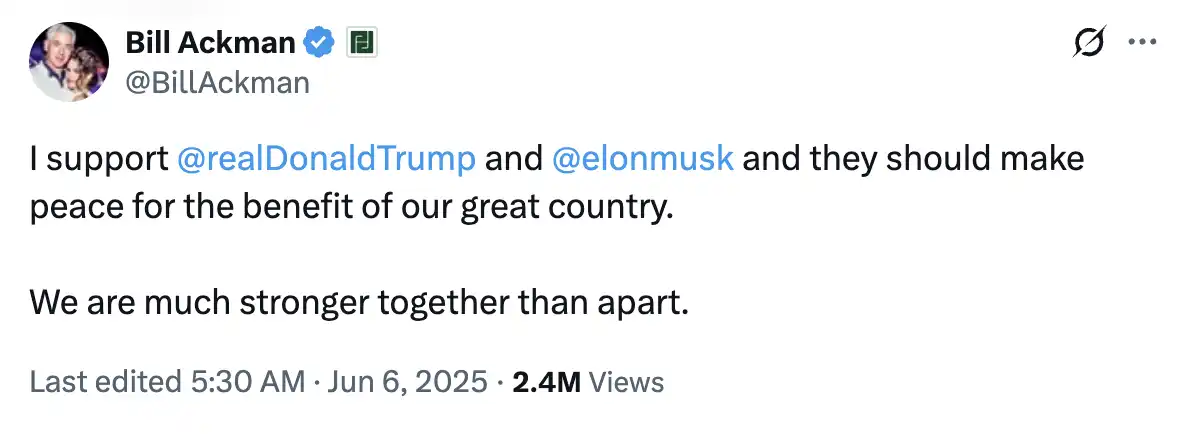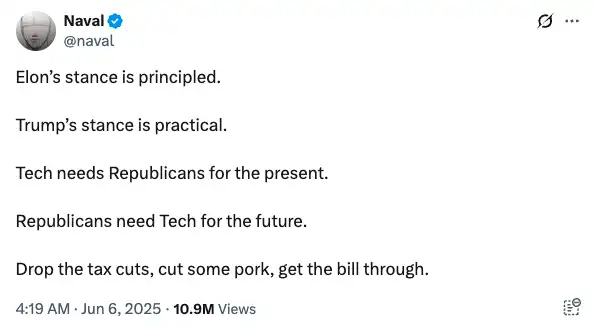In just a week, the relationship between U.S. President Donald Trump and the world's richest man, Elon Musk, has undergone a stunning reversal from White House allies to social media adversaries. This dispute, which began with policy differences, quickly escalated within 48 hours into a public feud filled with personal attacks and business threats, causing market turbulence.
Musk publicly stated on his owned platform X that he strongly opposes Trump's "Big and Beautiful Act," calling it a "disgusting and ugly act." He asserted that if the bill passes, it "will surely destroy America's finances." Trump labeled the billionaire as "crazy" and threatened to cancel his company's federal contracts. Musk retaliated by threatening to retire the crucial Dragon spacecraft that supports the International Space Station. Tesla's stock price plummeted in response.
Related reading: Trump and Musk's century-long feud, the president cuts ties with his ally
From initial policy cooperation to mutual political alliance, and ultimately to a complete fallout, the breakdown of the relationship between Trump and Musk represents a multifaceted conflict involving political capital and business interests, personal power and public image, a green future and traditional conservatism, ignited by a single "bill" that encapsulates the collapse of trust, resource competition, and power struggles, completely destroying what was once referred to as a "winner's alliance" in their brief political honeymoon.
Although the century-level quarrel between Trump and Musk has entered a full-blown confrontation stage, there are still those in Washington and Silicon Valley attempting to salvage this fractured political-business alliance. After all, a president with billions of votes and a tech giant controlling space, AI, and social platforms, their conflict not only tears apart the Republican camp but also shakes the future direction of capital markets and tech policy. The question is, who can mediate between Trump's extreme will and Musk's obsessive fervor? Who has enough political credibility, business acumen, or networking resources to advocate for peace rather than fan the flames? Now, all eyes are turning to those who might become the "mediators."
Who can build a bridge between Trump and Musk?
Bill Ackman, the billionaire founder of Pershing Square, was the first to step forward, stating that Trump and Musk should prioritize national interests. He expressed on X, "I support @realDonaldTrump and @elonmusk; they should shake hands and think about the interests of our great country. United, we will be stronger than fighting separately."

Subsequently, Musk commented on this post saying, "You’re not wrong," and after this reply, $TSLA rose 3% overnight, indicating that he and Trump should work together peacefully.
Currently, no more heavyweight figures have publicly taken sides or attempted to mediate this rare rift. This is not only because the situation is still evolving but also because the high risks of politics lead most to choose silence.
In contrast, voices from the economic and tech circles are more easily seen as "expressions of stance" rather than "factional declarations of war." Silicon Valley investors, entrepreneurs, and thinkers, such as AngelList co-founder Naval Ravikant, have directly stated: "Elon's stance is principled, while Trump's stance is pragmatic. The tech industry cannot do without the Republican Party, and the Republican Party cannot do without the tech industry in the future. No more tax cuts; cut some redundant spending and pass the bill."

But the real question is—who can build a bridge between Trump and Musk? At this cautious moment, every name on the list carries significant meaning:
Kevin McCarthy: Former Speaker of the House, has a good relationship with Musk, and has supported tech companies in legislation.
Peter Thiel: A core figure among Silicon Valley conservatives, has complex relationships with both Trump and Musk, and may exert influence behind the scenes.
Lindsey Graham, Marco Rubio: Senior senators who, if they step forward to mediate, could symbolize party unity.
Marc Andreessen: A venture capitalist who has supported Trump and also backs Musk, holding significant influence over tech policy.
David Sacks: A close friend of Musk, a centrist donor in the Republican Party, served as a tech advisor in the Trump administration, responsible for AI and cryptocurrency policy.
These individuals may have political leverage or close ties to both parties, yet none have taken action yet.
How does the crypto community view this century-long quarrel?
Trump, as a monarch, wields the power of manipulation through language, excelling in the "art of possibility," with flip-flopping being a characteristic of this power. From Machiavelli's perspective, honesty never benefits a prince. Machiavelli argues that one of the most important abilities of a prince is to always find ways to shape a believable illusion.
Musk, as an entrepreneur, aims to create a transparent and authentic environment as his organizational mission; he pushes the entire team to confront the most real issues to solve them promptly and effectively.
Their behavioral patterns and problem-solving endowments are very different; if harmonized well, they could be an extremely perfect partnership. Musk is the general, the Antony, with top-notch problem-solving and insight abilities; Trump is Caesar, shaping personal image, utilizing anyone he can, and rising swiftly. JD is the opportunistic Octavian.
These two simply cannot understand each other.
Elon Musk is too straightforward. He says whatever comes to mind, rarely considering others' reactions. He is accustomed to expressing disagreements in public rather than resolving them privately, often alienating allies as a result.
Because he is a "STEM engineer," leading a team of STEM engineers, to lead such a team, one must be 100% authentic and transparent.
Donald Trump, on the other hand, is too worldly. He does not express his true thoughts but rather what is most advantageous to his plans. He too can alienate allies, but the reason is that he demands unconditional support while never revealing his strategic intentions to them.
As a New York real estate developer, he wins through negotiation and benefits from information asymmetry, which requires him to be 100% calculating and 100% opaque.
Here’s how things developed:
Musk worked very hard and took on significant personal risk to push for a balanced federal budget. He genuinely believes that federal overspending poses an existential threat to the nation.
Trump views this fiscal saving as a political asset.
Lacking leverage in Congress, he uses this fiscal space to exchange for other outcomes he values more, such as border control and the judicial system—issues he also considers existential threats to the nation.
He may indeed have a medium- to long-term plan for a balanced budget, but frustratingly, he does not share these plans with his team.
In fact, Trump could have coordinated with Musk privately in advance, but he either assumes Musk should be loyal (treating allies as subordinates) or simply cannot persuade Musk.
Musk could also choose to express his dissatisfaction privately, but he was either too angry to communicate at the time or attempted to communicate but could not reach a consensus.
Trump does not know how to deal with "STEM straight shooters." They want the truth, not to read between the lines. They refuse to guess at subtext and only accept direct and candid communication.
Musk also does not know how to deal with "Machiavellian figures." The latter uses language as a tool of power and scoffs at those who insist on speaking the truth, viewing it as childish.
Both are used to being leaders, accustomed to others accommodating their communication styles.
Thus, they both lack the patience and ability to understand each other's language systems.
But the reality is: the out-of-control federal budget and the massive federal bureaucracy indeed pose a dual existential threat to the United States that must be prioritized.
Trump's judgment of "political possibilities" may be reasonable, but Musk's sense of urgency should not be underestimated.
To leverage the outstanding abilities of those on the autism spectrum while completely disregarding their special needs is an extremely narrow-minded approach.
Of course, STEM individuals can sometimes be very stubborn, even if they are not the richest or most successful people in the world.
A few more points are worth noting:
The Democratic Party remains completely silent on this. Because strictly speaking, there is no longer a "Democratic Party"; they have no real intellectuals, only hired mouthpieces who speak for money.
The so-called response will only come after the "completely natural, grassroots" public relations committee meets and then issues a "natural grassroots" check to these "natural grassroots" opinion leaders.
There is also a possibility that the "nothing will happen faction" is correct—after all, Musk often falls silent after a burst of anger, and Trump can call you the Antichrist today and still work with you tomorrow.
免责声明:本文章仅代表作者个人观点,不代表本平台的立场和观点。本文章仅供信息分享,不构成对任何人的任何投资建议。用户与作者之间的任何争议,与本平台无关。如网页中刊载的文章或图片涉及侵权,请提供相关的权利证明和身份证明发送邮件到support@aicoin.com,本平台相关工作人员将会进行核查。



